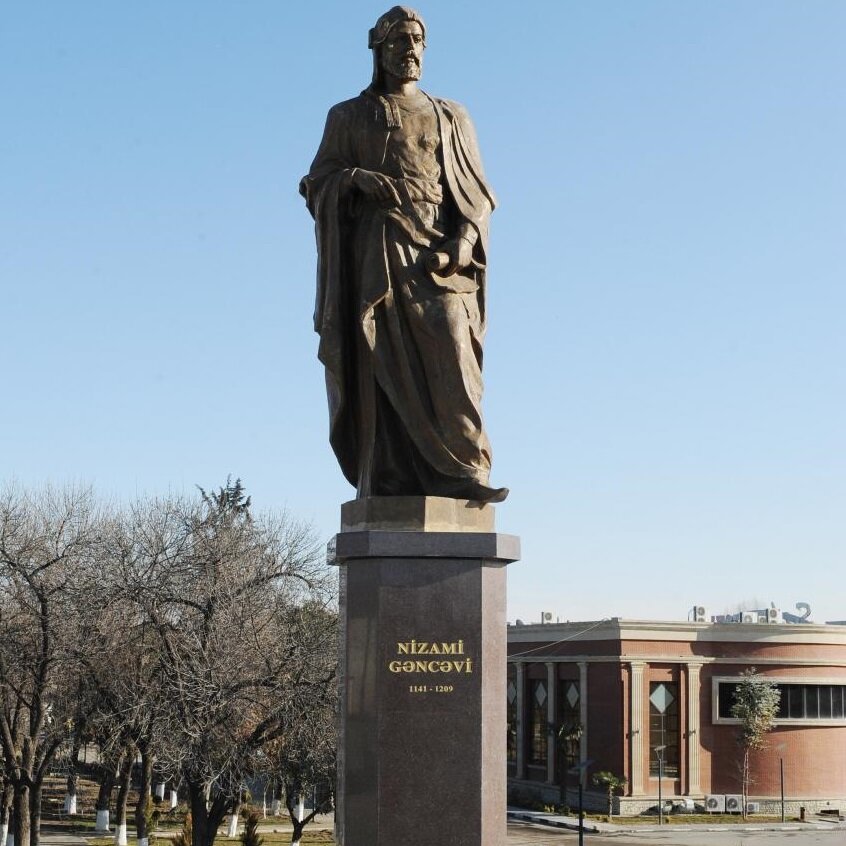Iran, Azerbaijan to collaborate on film project about Hakim Nizami

TEHRAN-In a joint effort to celebrate their shared cultural heritage, Iran and Azerbaijan will collaborate on a new cinematic project about the great Persian poet of the 12th century Hakim Nizami, the Iranian Minister of Culture and Islamic Guidance said on May 1.
Mohammad Mehdi Esmaeili was in Baku, Azerbaijan, to participate in the 6th World Forum on Intercultural Dialogue, IRNA reported.
On the sidelines of his visit to the National Museum of Azerbaijan Literature in Baku, he emphasized the shared cultural figures as bridges of convergence. “These luminaries represent a collective cultural heritage that has bound Iran and Azerbaijan together for centuries. He stressed that these cultural capacities should foster brotherhood and mutual understanding.
Highlighting the significance of Persian poetry and its common legacy between Iran and Azerbaijan, Esmaeili expressed hope that the movie would be produced with the cooperation of the Ministry of Culture of the Republic of Azerbaijan.
Jamal al-Din Abu Muhammad Ilyas ibn Yusuf ibn-Zakki, popularly known as Nizami Ganjavi and Hakim Nizami, was a Muslim poet and is considered the greatest romantic epic poet in Persian literature who brought a colloquial and realistic style to the Persian epic. His heritage is widely appreciated in Iran as well as the Republic of Azerbaijan, Afghanistan, the Kurdistan region, and Tajikistan.
Nizami influenced Persian poets who came after him. He had a wide range of knowledge of the common sciences of his time (such as literary sciences, astronomy, Islamic sciences, jurisprudence, theology, and Arabic language) and this feature can be clearly witnessed in his poetry.
He was very particular in selecting appropriate words and phrases, creating new and innovative combinations, inventing new and pleasant meanings and themes, depicting details with the power of his imagination, describing landscapes and describing nature and people, and using pleasant and new similes and metaphors, which ranks him among those who were unparalleled in comparison to those poets who came after him.
The famous and unparalleled masterpiece left behind by Nizami is “Khamseh or Panj Ganj” (Five Treasures), a lofty work in the realm of lyrical stories. He had spent 30 years of his life arranging and compiling his poetry.
“Panj Ganj” comprises five Mathnavis (long narrative poems) of “Makhzan al-Asrar” (‘The Treasury or Storehouse of Mysteries.’ one of the prominent examples of educational literature in the Persian language), “Khosrow and Shirin” (the love story of Khosrow Parviz, the great king of the Sassanid Empire and the Armenian princess, Shirin), “Leily and Majnun” (the most famous classic love story of Persian literature), “Haft Peykar” (‘The Seven Beauties’), and “Eskandarnameh” (‘The Book of Alexander’).
March 12 has been named as Nizami Ganjavi Commemoration Day in the official Iranian calendar. In addition to Iran, Nizami’s statues can be found in Azerbaijan, China, Italy, etc.
Furthermore, during his visit to the National Museum of Azerbaijan Literature, the Iranian Culture Minister expressed interest in producing collaborative films with other neighboring countries, considering their shared historical heritage. Notably, “similar efforts are underway in Turkmenistan for the poet Magtymguly Pyragy and in Pakistan for the poet Iqbal Lahori.
Pyragy (1724–1807) was a Turkmen spiritual leader, philosophical poet, Sufi, and traveler, considered the most famous figure in Turkmen literary history.
He was born in a village near the city of Gonbad-e Qabus in the modern-day province of Golestan, Iran, the northern steppes of which are known as Turkmen Sahra. It was part of the extensive Safavid Empire in the first half of the 18th century.
He is the greatest representative of Turkmen literature, credited with the creation of Turkmen written literature, and whose literary form became a powerful symbol of the historical and incipient national consciousness of the Turkmen people. He is part of a unique period in the cultural history of Central Asia, with his exceptional talent projecting his personal poetic synthesis onto the next generation of poets of the region.
Allama Muhammad Iqbal, known as Iqbal Lahori, (1877–1938) was a South Asian academic, poet, barrister, philosopher, and politician who is considered one of the most important figures in Urdu literature, with literary works in both Urdu and Persian languages.
Iqbal is admired as a prominent classical poet in Iran, Pakistan, India, Bangladesh, and Sri Lanka and also by international scholars of literature.
He is widely known as the poet of Islam or the poet of the East. However, about 60 percent of the works of Iqbal are in the Persian language, which makes him equally popular in Iran. His poetry has been translated into many languages.
After the creation of Pakistan in 1947, he was named the national poet there. He is also known as the “Hakeem-ul-Ummat” (The Sage of the Ummah) and the “Mufakkir-e-Pakistan” (The Thinker of Pakistan).
The 6th edition of the World Forum on Intercultural Dialogue, operating under the theme “Dialogue for Peace and Global Security: Cooperation and Interconnectivity,” was convened from May 1 to 3 in Baku. The forum, part of the “Baku Process” initiated by President Ilham Aliyev in 2008, was conducted in collaboration with prominent international entities such as the United Nations Alliance of Civilizations (UNAOC), UNESCO, the UN Tourism, and the Islamic World Educational, Scientific, and Cultural Organization (ISESCO).
The primary objective of the 6th World Forum on Intercultural Dialogue was to explore the critical intersections between dialogue facilitation, cooperative frameworks, leadership efficacy, and the complex dynamics of interconnectedness, all in the service of advancing global peace and security imperatives.
Over three days, a series of plenary sessions and panel discussions brought together a diverse array of stakeholders, including government officials, representatives from international organizations, eminent cultural figures, journalists, civil society actors, and intellectuals from across the globe, to deliberate upon pressing global challenges.
SS/
Leave a Comment